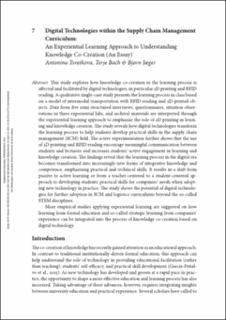| dc.contributor.author | Tsvetkova, Antonina | |
| dc.contributor.author | Bach, Terje | |
| dc.contributor.author | Jæger, Bjørn | |
| dc.date.accessioned | 2024-01-18T13:39:23Z | |
| dc.date.available | 2024-01-18T13:39:23Z | |
| dc.date.created | 2021-04-14T08:33:39Z | |
| dc.date.issued | 2021 | |
| dc.identifier.citation | Tsvetkova, Antonina; Bach, Terje; Jæger, Bjørn. Digital technologies within the supply chain management curriculum : an experiential learning approach to understanding knowledge co-creation (an essay). I: Supplemental instruction : volume 1: digital technologies, Strømmen-Bakhtiar, Abbas; Helde, Roger; Suzen, Elisabeth (eds.), 87-104. Waxmann Verlag | en_US |
| dc.identifier.isbn | 978-3-8309-4324-2 | |
| dc.identifier.uri | https://hdl.handle.net/11250/3112550 | |
| dc.description.abstract | This study explores how knowledge co-creation in the learning process is affected and facilitated by digital technologies, in particular 3D printing and RFID reading. A qualitative single-case study presents the learning process in class based on a model of intermodal transportation with RFID reading and 3D-printed objects. Data from five semi-structured interviews, questionnaires, situation observations in three experiential labs, and archival materials are interpreted through the experiential learning approach to emphasize the role of 3D printing in learning and knowledge creation. The study reveals how digital technologies transform the learning process to help students develop practical skills in the supply chain management (SCM) field. The active experimentation further shows that the use of 3D printing and RFID reading encourage meaningful communication between students and lecturers and increases students’ active engagement in learning and knowledge creation. The findings reveal that the learning process in the digital era becomes transformed into increasingly new forms of integrative knowledge and competence, emphasizing practical and technical skills. It results in a shift from passive to active learning or from a teacher-centered to a student-centered approach to developing students’ practical skills for companies’ needs when adopting new technology in practice. The study shows the potential of digital technologies for further adoption in SCM and logistics curriculums beyond the so-called STEM disciplines. More empirical studies applying experiential learning are suggested on how learning from formal education and so-called strategic learning from companies’ experience can be integrated into the process of knowledge co-creation based on digital technology. | en_US |
| dc.language.iso | eng | en_US |
| dc.relation.ispartof | Supplemental instruction : volume 1: digital technologies | |
| dc.relation.uri | https://elibrary.utb.de/doi/pdf/10.31244/9783830993247 | |
| dc.rights | Attribution-NonCommercial-NoDerivatives 4.0 Internasjonal | * |
| dc.rights.uri | http://creativecommons.org/licenses/by-nc-nd/4.0/deed.no | * |
| dc.title | Digital technologies within the supply chain management curriculum : an experiential learning approach to understanding knowledge co-creation (an essay) | en_US |
| dc.type | Chapter | en_US |
| dc.description.version | publishedVersion | en_US |
| dc.source.pagenumber | 87-104 | en_US |
| dc.identifier.cristin | 1903904 | |
| cristin.ispublished | true | |
| cristin.fulltext | original | |
| cristin.qualitycode | 2 | |

